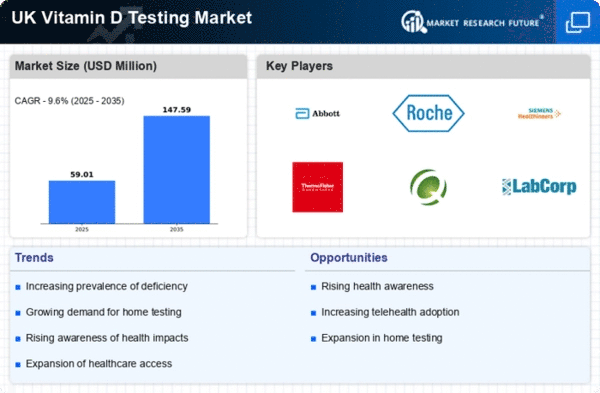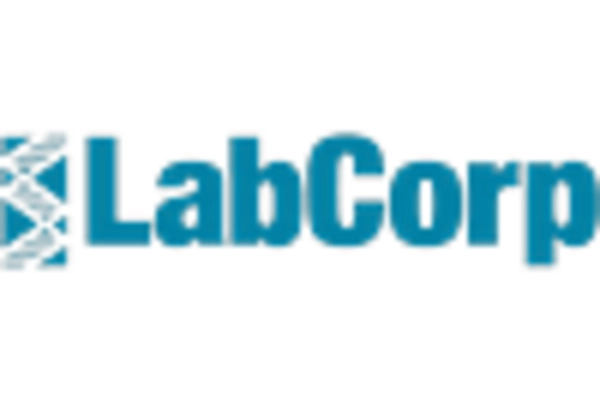Government Health Initiatives
Government initiatives aimed at improving public health are significantly influencing the vitamin d-testing market. The UK government has launched campaigns to raise awareness about the importance of vitamin D for overall health, particularly for vulnerable populations such as children and the elderly. These initiatives often include recommendations for regular testing and supplementation, which could lead to increased testing rates. The vitamin d-testing market is expected to see growth as these programs encourage healthcare providers to offer testing services more widely, thereby enhancing accessibility and affordability for the general population.
Growing Demand for Preventive Healthcare
The shift towards preventive healthcare is a notable driver for the vitamin d-testing market. As individuals become more proactive about their health, there is a rising demand for testing services that can identify potential deficiencies before they lead to serious health issues. This trend is reflected in the increasing number of health check-up packages offered by clinics and hospitals, which often include vitamin D testing. The vitamin d-testing market is likely to expand as more consumers prioritize preventive measures, leading to a higher uptake of testing services and products.
Increased Prevalence of Vitamin D Deficiency
The rising incidence of vitamin D deficiency in the UK population is a crucial driver for the vitamin d-testing market. Studies indicate that approximately 20% of adults in the UK are deficient in vitamin D, particularly during the winter months when sunlight exposure is limited. This deficiency is linked to various health issues, including bone disorders and immune dysfunction. Consequently, healthcare providers are increasingly recommending vitamin D testing to monitor levels and prevent associated health risks. The vitamin d-testing market is likely to benefit from this growing awareness, as more individuals seek testing to ensure adequate vitamin D levels, thereby driving demand for testing services and products.
Technological Innovations in Testing Methods
Technological advancements in testing methods are transforming the vitamin d-testing market. Innovations such as point-of-care testing and home testing kits are making it easier for individuals to assess their vitamin D levels without the need for laboratory visits. These developments not only enhance convenience but also improve the accuracy and speed of results. The vitamin d-testing market is poised for growth as these technologies become more widely adopted, allowing for greater consumer engagement and facilitating timely interventions for those identified as deficient.
Integration of Testing in Routine Health Check-ups
The integration of vitamin D testing into routine health check-ups is emerging as a significant driver for the vitamin d-testing market. Healthcare professionals are increasingly recognizing the importance of monitoring vitamin D levels as part of comprehensive health assessments. This trend is supported by clinical guidelines that recommend testing for at-risk populations. As a result, the vitamin d-testing market is experiencing growth, with more healthcare facilities incorporating vitamin D tests into their standard offerings, thereby increasing accessibility for patients and promoting regular monitoring.
















